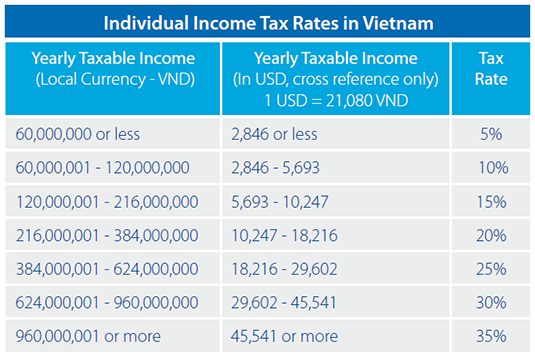Personal Income Tax Withholding in Vietnam
HANOI – In Vietnam, Personal Income Tax (PIT) declaration and payment is carried out on a withholding basis. Vietnam’s tax regulations encompass the concept of tax deduction at source, and legalize this by specifying that certain employers are designated entities for tax collection purposes. Such entities are required to withhold PIT from employees’ salaries.
Employers are required to collect taxes on employee income for both foreign and local Vietnamese employees, and ensure the timely submission of employees’ tax declarations. Employers must withhold the required percentage of their employees’ personal income, and deposit the monthly amount with the State Treasury no later than the 20th day of the following month.
 RELATED: Dezan Shira & Associates’ Payroll and Human Resources Services
RELATED: Dezan Shira & Associates’ Payroll and Human Resources Services
Employers must also finalize PIT declarations on behalf of their employees at the end of the year provided the employee only has income from the employer, and authorizes their employer to make this tax finalization on their behalf. An annual tax finalization on employees’ taxable income must be submitted by companies to the relevant tax authorities no later than 90 days from the last day of the tax year.
Each employee is required to obtain a unique individual tax number (tax code) and declare dependents that qualify for tax relief. Additionally, employees must complete their own tax finalization returns where their tax liability at year-end is greater (or less) than the sum of tax paid during the year. Employees may authorize the company to complete this process on their behalf.

 This article is an excerpt from the January and February 2014 issue of Asia Briefing Magazine, titled “Payroll Processing Across Asia.” In this issue of Asia Briefing Magazine, we provide a country-by-country introduction to how payroll and social insurance systems work in China, Hong Kong, Vietnam, India and Singapore. We also compare three distinct models companies use to manage their payroll across various countries with external vendors, and explain the differences among three main models: country-by-country, managed, and integrated models while highlighting some benefits and drawbacks of each.
This article is an excerpt from the January and February 2014 issue of Asia Briefing Magazine, titled “Payroll Processing Across Asia.” In this issue of Asia Briefing Magazine, we provide a country-by-country introduction to how payroll and social insurance systems work in China, Hong Kong, Vietnam, India and Singapore. We also compare three distinct models companies use to manage their payroll across various countries with external vendors, and explain the differences among three main models: country-by-country, managed, and integrated models while highlighting some benefits and drawbacks of each.
Dezan Shira & Associates is a specialist foreign direct investment practice, providing corporate establishment, business advisory, tax advisory and compliance, accounting, payroll, due diligence and financial review services to multinationals investing in emerging Asia. Since its establishment in 1992, the firm has grown into one of Asia’s most versatile full-service consultancies with operational offices across China, Hong Kong, India, Singapore and Vietnam as well as liaison offices in Italy and the United States.
For further details or to contact the firm, please email asia@dezshira.com, visit www.dezshira.com, or download the company brochure.
You can stay up to date with the latest business and investment trends across Asia by subscribing to Asia Briefing’s complimentary update service featuring news, commentary, guides, and multimedia resources.
- Previous Article Vietnam’s Middle Class the Fastest Growing in Southeast Asia
- Next Article New Issue of Vietnam Briefing: A Guide to Understanding Vietnam’s VAT









